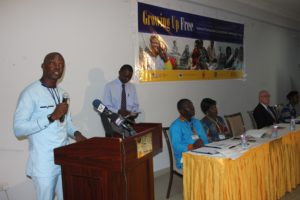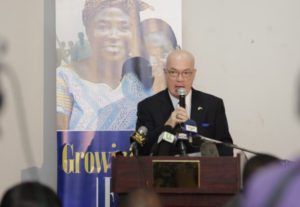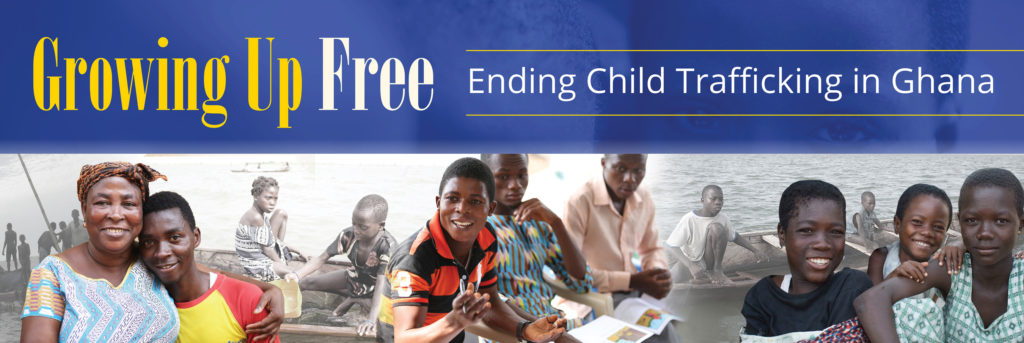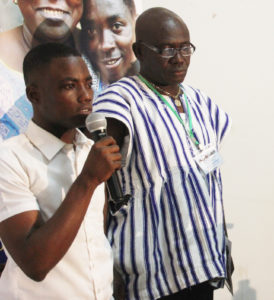Ghana is partnering with the U.S. government and civil society organizations to eradicate child trafficking here, a country where modern-day slavery is rampant. Political officials, NGOs and community leaders gathered in Accra last week for the first-ever anti-human trafficking symposium aimed at bringing together government and civil society to conquer the human rights crisis of child slavery. The event highlighted the challenges Ghana is facing and addressed strategies and solutions to overcome those obstacles.

FTS Ghana Director Joha Braimah address the symposium | Photo: FTS Weiss
“Child trafficking and modern slavery can be conquered if we all pull together,” said Free the Slaves Ghana Country Director Joha Braimah. “That’s the purpose of today: bring everyone together, evaluate the situation together, map out the solution together, and then leave this room filled with commitment and motivation and confidence that together we will make a difference.”
Free the Slaves hosted the symposium in partnership with the governments of Ghana and the United States, Right To Be Free, International Needs Ghana and other civil society groups. In 2015, Ghana and the U.S. signed the first Child Protection Compact Partnership, a five-year initiative with the goal of enhancing anti-trafficking measures – including prevention, prosecution of traffickers, and protection of victims. The U.S. awarded grants to Free the Slaves and its partners to implement strategies to improve these key areas.

U.S. Ambassador to Ghana Robert Jackson addresses the symposium | Photo: State Dept.
“The United States is proud to be partnering with the Ghanaian government and the anti-trafficking civil society community in this effort,” U.S. Ambassador to Ghana Robert Jackson told the symposium. “For the sake of the victims that remain in captivity, we must continue this fight.”
In June, the U.S. State Department gave Ghana a Tier 2 Watch List rating for the second consecutive year in its annual Trafficking in Persons Report. Ghana will be automatically downgraded to Tier 3 next year if its government fails to make significant efforts to meet “the minimum standards for the elimination of trafficking in persons,” or receives a special waiver, according to the report. A Tier 3 ranking could mean the loss of substantial U.S. financial assistance.
With five months left in this reporting year, Ghana has “very little to show for,” according to Yvonne Obuobisa, the acting director of public prosecutions for Ghana’s Attorney General’s Department. She urged government, law enforcement and civil society groups at the symposium to work together to prevent a potential downgrade. She identified a lack of funding, staff and efficient investigative and prosecution procedures for Ghana’s challenges in eradicating human trafficking.
Victoria Natsu, the executive secretary of Ghana’s Human Trafficking Secretariat, echoed Obuobisa’s concerns.
“The problem is not that we don’t know what we’re doing. The money has not come. That’s the issue,” Natsu said.

The Growing Up Free program, led by Free the Slaves and funded by the Child Protection Compact agreement between the U.S. and Ghana, is designed to help. The program description explains it is “creating a comprehensive, integrated plan for prevention, rescue, prosecution, rehabilitation, reintegration and education to overcome child fishing slavery.” The program has four key goals: “build Ghana’s capacity to respond to child trafficking; educate and mobilize communities to identify children who have been trafficked and refer them for rescue; assure that families can provide for the basic needs of their children; and increase public awareness and knowledge to prevent child trafficking from occurring and promote appropriate community action when child trafficking is suspected.”
In addition to speaker presentations from various sectors of society, the symposium also featured breakout discussion groups to debate the implementation of best practices and encouraged questions and comments from audience members throughout the day.
“It’s a good thing that we’re bringing all the stakeholders together to fight trafficking because this is not something one organization can do,” said Louisa Asigrri Telly, a representative with the Ghana office of the U.N. International Labor Organization, who attended the symposium. “Bringing us together like this and creating awareness about child trafficking will help us find concrete solutions.”
The nearly 120 attendees also heard from a survivor of child trafficking in Ghana’s fishing industry, who told his story alongside a former trafficker who now speaks out about the illicit trade.

Child slavery survivor Christian Atsem address the symposium | Photo: FTS/Weiss
“Sometimes I didn’t even eat,” said Christian Atsem, speaking of the conditions while he was enslaved. “We didn’t have a particular time to sleep in the night. We were always working.”
Atsem was lured into forced labor after his father died when he was just 5, leaving him and his two sisters with their mother, who struggled to care for them. He was rescued after years in captivity. Now he is 19 and studying to become a doctor.
The stories of real-world experiences resonated with many of the attendees.
“It’s nice to get some of the victims to share their experiences and to identify the challenges with regard to human trafficking in Ghana,” said John Amoah, the Apam District officer for Ghana’s Commission on Human Rights and Administrative Justice. “I’m happy we’ve gathered here to know how we can fill the gaps to push our country to where it ought to be.”
Editor’s Note: Brennan Weiss is a freelance journalist based in Accra, who reported this story in association with FTS. Learn more about Free the Slaves work in Ghana, including video of a child slavery rescue, on our Ghana webpage.



